HOW CLIMBING MADE PATXI USOBIAGA A BETTER PERSON

HOW CLIMBING MADE PATXI USOBIAGA A BETTER PERSON
The Spaniard, Patxi Usobiaga, has certainly achieved a lot in his 41 years. He has a long career as a professional rock climber, sport climber and boulderer behind him. He won two Lead Climbing World Cups in succession and during his career has climbed 267 8a to 9a+ routes, 158 of them onsight. He was the first climber to onsight an 8c+ route (Bizi Euskaraz, in Etxauri, 2007).
Each goal that’s achieved brings with it closure and also marks the start of something different. And Patxi has certainly experienced more than his fair share of endings and new beginnings. In this in-depth interview with this likeable bundle of energy, we talk about passion as a driver for personal happiness, love at first sight, the power of resilience, trust and friendship, and how the destructive elements of one's personality can be transformed into positive energy. Inspiring and fascinating, it’s a very personal insight into the life and character of deuter’s latest Alpine Family member.
The early years
Patxi started climbing aged ten, near his home in Atxarte, in the Basque country. For the first four years he was belayed by his father. When he was 15, he climbed his first 8a route, Conan Dax Librarian, in Araotz. When he was 15, he redpointed his first 8b route, Parva Naturalia, in Araotz. From 1994 to 1999 he competed in junior competitions. In 2000, he started competing in the Lead Climbing World Cup. and won his first gold medal at the event in Edinburgh in 2003.
String of success and new beginnings
When he was 26, Patxi won his first Lead climbing World Cup. The following year, he won his second one. Due to these outstanding achievements, he was awarded the Salewa Rock Award in 2007. In 2009, he won the Lead Climbing World Championships in Qinghai (China) after placing second 3 times (2003-2005 and 2007). At the end of 2009, he underwent shoulder surgery and after three months of rehabilitation he started training again. In June 2010, he was in a car accident and suffered a painful slipped disk. In 2011, he announced he was retiring from the competition scene.
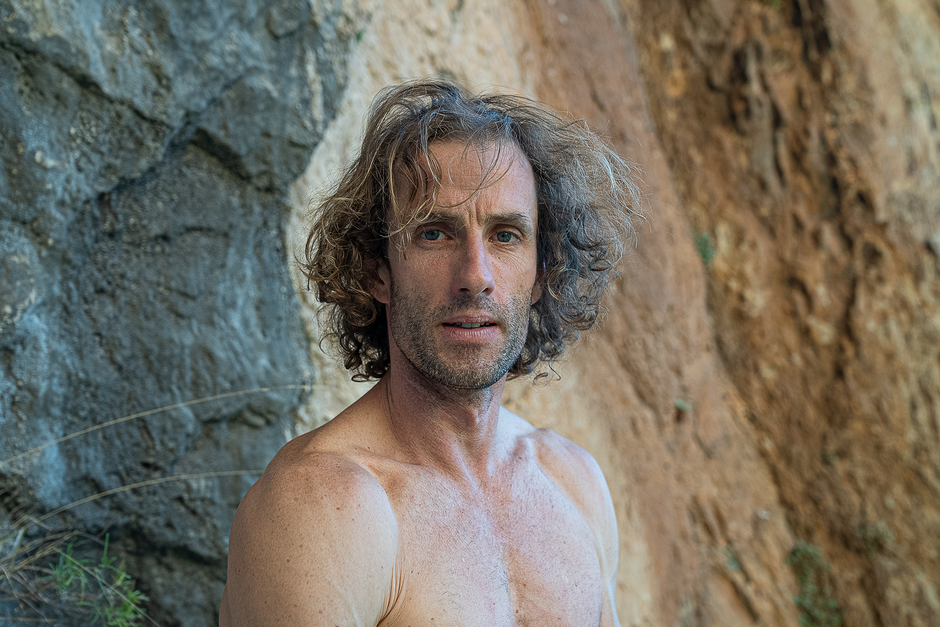
Patxi, your climbing CV is unreal. You are one of the most successful climbers of recent years and your name is mentioned in the same breath as other climbing icons like Alex Honnold and Adam Ondra. How would you describe yourself?
I’m not sure how to describe myself. I’d say I’m the sort of person who expects a lot from himself, and I’m very passionate about the things that I enjoy, especially things that are related to physical activity and things that make you demand a lot from yourself. In terms of pursuing goals that means that the process of evolving never stops.
What does climbing mean to you?
It’s a way of realising my happiness. We all need something to fight for, a reason to try to be better and a better person. Climbing is what makes this possible for me and so it’s become my passion and it’s what I’m dedicated to.
What inspired you to climb or was it a calling?
It was love at first sight. I first saw it on the television, and from there I went to climb for the first time. I’ve never been very strong, and that was even more the case when I was younger. But I had tenacity and perseverance, and like other endurance athletes, I was and still am able to push on through, to suffer and stick at the whole process until I achieve my goals.
How did it all start and why did you get ‘addicted’ to climbing in the beginning?
I don’t know. It just happened. In fact, one of my plus points and bad points is being so hard on myself. Which meant that at the start, I got frustrated a lot, because I wanted something badly and couldn’t achieve it. Little by little I was able to overcome those fears and could begin to climb the routes that I wanted and evolve the way I wanted.
Rock climbing, sport climbing, bouldering… was there a special order to how you discovered the different climbing types and if so, why and how did you switch from one style to the other?
Personally, from the very beginning I have always been a sport climber. I dedicated myself to competition climbing over a long period of my life, the most demanding style of any sporting discipline. I like sport climbing because of how demanding it is.
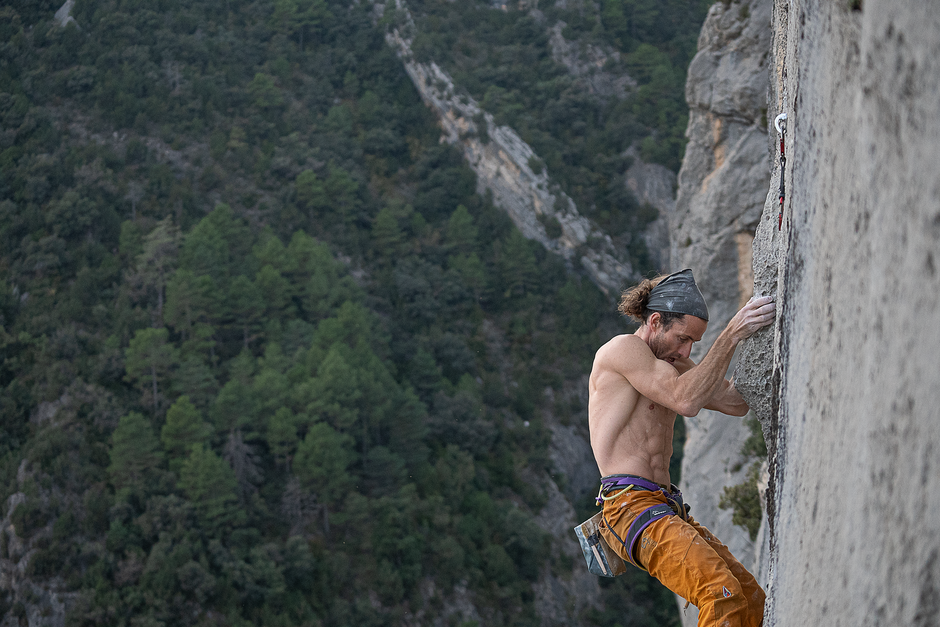
Did you or do you have a preferred style and why?
I actually like all styles, but because of certain things I have specialized in slightly overhanging walls. It’s the angle at which my injuries allow me to give my all and allow me to enjoy myself trying to climb hard projects. I like to try my hardest and on extremely overhanging walls I just damage my body. Either through luck or destiny, I happen to live in a paradise of lightly overhanging rock.
And how would you describe your climbing style or approach to climbing?
I know how to make the most of my resources, I know my body really well and this helps me manage my potential 100%.
Where do you love climbing most, what’s your favorite climbing spot and why?
Coll de Nargó, Ceuse, Frankenjura, Red River Gorge, Montserrat and Siurana are my favorite spots. They are all very different, but all on exceptional rock, and the routes are of the highest quality.
Is there a climbing spot that you still dream of, but haven’t yet explored?
There are many places that I still haven’t visited. Nearly all of them are far from here, and so that means I really enjoy climbing with the peace of mind that comes from being at home. But Yosemite, Indian Creek, Hueco Tanks, Rocklands and many more are on my list too.
Who is your favorite climbing partner and why?
I love climbing with my friends, motivated friends. We can talk a lot together without climbing being the most important thing. Because we’re having such a good time, it means we tend to get to the top a lot.
What does Zero Gravity mean to you?
I don’t like the thought of it. Zero gravity would mean that it would be impossible to enjoy the challenges of gravity. That’s why I love gravity.
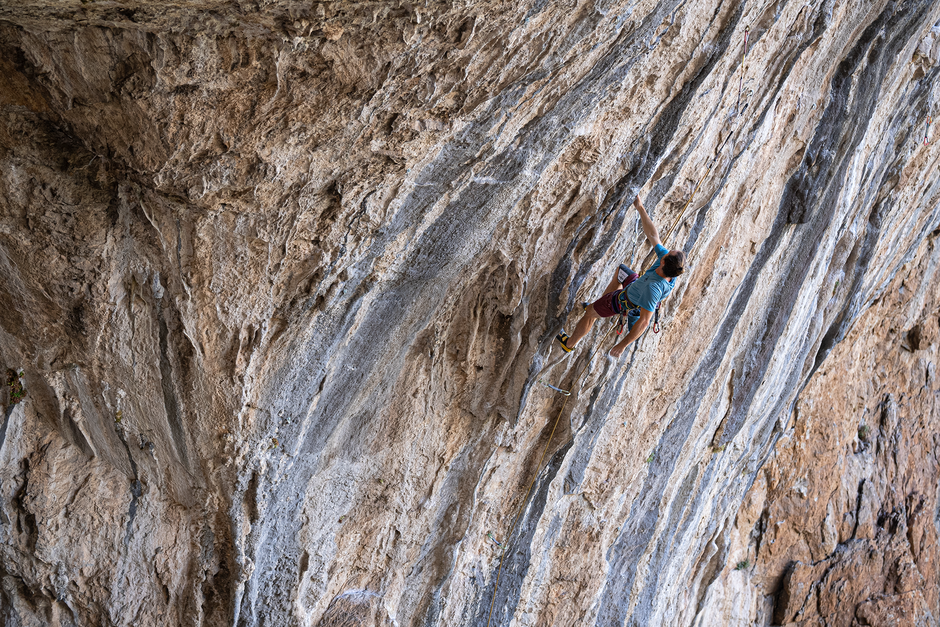
You are Adam Ondra’s coach. How did that come about?
Adam and I first met when we were competing head-to-head in the 2009 World Championships. It was the year that I won, and he missed out on gold by a small margin. That same year, we battled it out for the World Cup and Adam walked away with the win. And I finished off the year with surgery after dislocating my shoulder on Pachamama, with three world cup comps still to go. After that I retired and started PUC training in 2012, and in 2014 we started working together with just one objective in mind: winning the Lead Climbing World Championship. And in 2014, that same year, Adam won the Bouldering World Championship and the Lead World championship. From 2014 on, the objectives varied, evolved and mutated depending on his motivation. It’s great fun working with him. Adam is pure motivation. That’s why it’s special being able to help him in the processes that motivate him, being able to share my experience with him in terms of sending routes, winning or succeeding in his objectives.
What do you think makes your relationship so special? About you, he says: “He is the only one I truly and fully trust.”
I suppose I give him confidence. I know him, I know the kind of person he is, and apart from that we have very similar personalities, and that means that my experience helps us trust in one another.
What do you focus your coaching on? Mental and physical strength? Techniques? Strategies? Or a combination of them all?
Since my training platform is online, my main objectives are those that I can manage online, and which I am good at or conscious of; mental, physical and strategy. It’s difficult to work on technique online. For that, you need to be in the same place as the athlete. Although that doesn’t mean to say that technique doesn’t improve as a consequence. The mental and physical training makes you more aware of your needs and makes you able to improve technically.
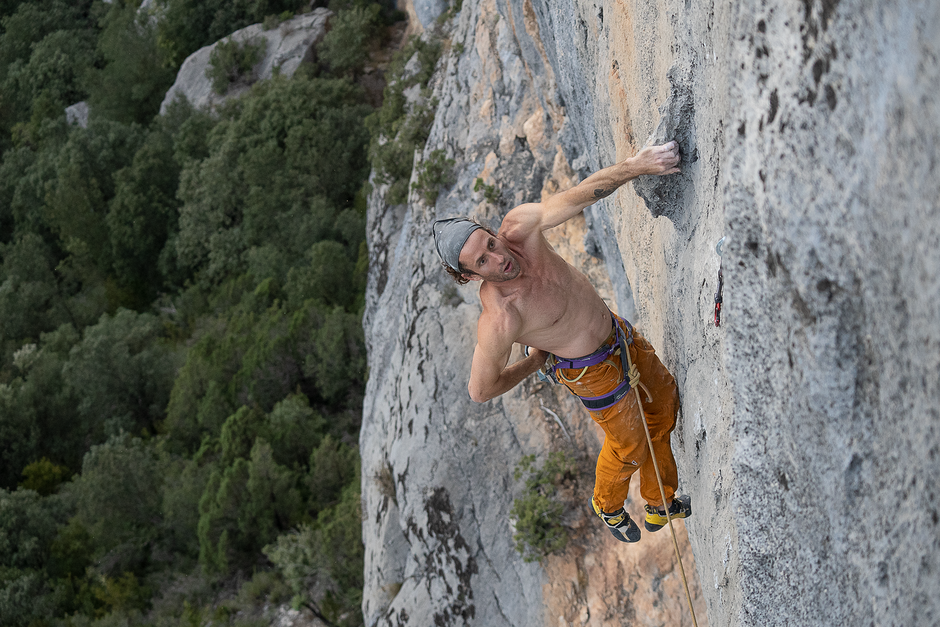
What about gear? How important is it? Do you have a favorite deuter product? And if so, which one?
Gear is really important. It’s crucial that it gives you confidence, safety and performance. I love to go sport climbing and training with the Gravity Motion together with the Gravity Rope Bag. When I need to carry more equipment and above all when I’m going bolting with a heavy pack, I use the Gravity Wall Bag and the Gravity Rope Sheet for my ropes. I think it’s great, it’s a brilliant design. Apart from being nice looking and having a bit of style, they’re good for me because of the problems I have with my neck (I had an operation on a herniated disk in my cervical spine in 2019). They’re ergonomic and distribute the weight well across your back – very important for a backpack. And when I travel to events, I take the Aviant Duffle Pro 40 with me – it’s incredible. And I also like the Gravity Chalk Bag II L, it’s the perfect size to fit your hand, it’s robust and has two brush holders, in case you let one drop. I’m very happy with the gear from deuter!
How did you manage to come back after your car accident? What gave you the strength and the will to return to climbing and to send your biggest success “Pachamama”?
When they diagnosed me with a herniated disk, I was out of the game immediately. I spent the next 3 years surfing and trying to be happy. I was happy. And I lived a very different life compared to what I was used to. But one day I returned to the world that had been my life for so long. And Pachamama had been, in some ways, the route and the moment in time where everything changed. And I felt like I had to go back and finish it. 8 years later I found myself there fighting to send it.
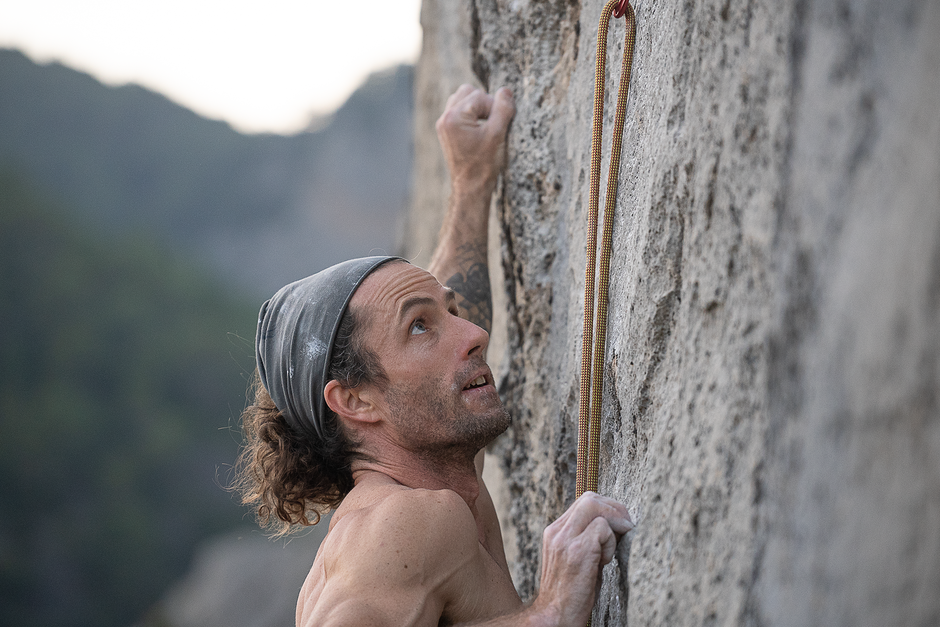
Is it your biggest achievement? Or, if not what was your biggest success?
I’d say it was just another objective that I was able to achieve. Nothing is comparable to winning a World Cup, or a World Championship, because it’s not only up to you. But yes, it was definitely a super challenging project of mine in the last ten years. It’s difficult to answer a question like that, because each route that you do, or each competition success you have, is an ending and also the beginning of another project.
What does Alt Urgell mean to you? How would you describe your home turf and the influence it has had on you, your character and your climbing?
Destiny brought me here. El Contrafort de Rumbao trapped me with various routes that made me crazy to climb them. In this process I met Ingrid, who I share a family with. And I’m grateful to destiny for where I am now, with the family that I have and with so much rock, so many routes and projects around. This valley is incredible.
Describe the perfect day for you?
I wake up with the family, make some nice pancakes, and enjoy them with a good cup of tea for a while. From there, I’d go to a good wall, if I have a line to bolt, bolt it, and afterwards put on my shoes and climb. All of this in the best company and with a lot of laughs.
What do you do when you aren’t climbing?
There are moments in which I am very creative, and I like to put my mind to thinking about creating new personal projects. That’s why it’s unlikely you’ll see me sitting still.
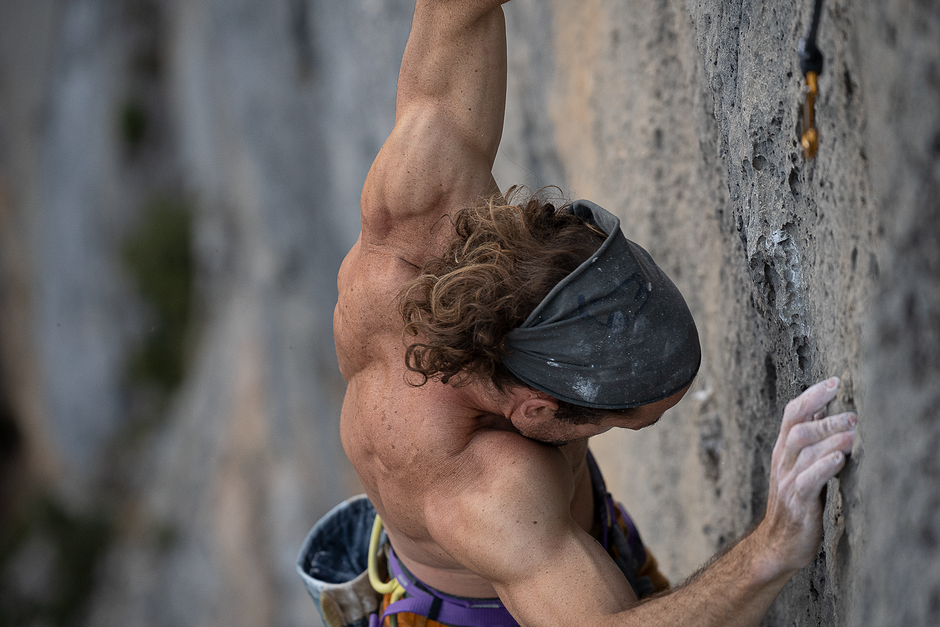
What are you most proud of about yourself and what would you like to improve?
When I look back at my career in sport, I’m proud of how I fought and achieved everything that I set my mind to. It makes you into a certain type of person, and sometimes being so demanding of yourself can change into something that’s not that healthy. That’s why I have to learn to manage these feelings.
How would your friends describe you - or your friend Alex, say? (Alexander Hick made the film ‘Long Way Home’ about his friend Patxi Usobiaga - watch the film here)
Alex says: I met Patxi two years ago at the local climbing gym that he was building back then. He told me about some hidden-away climbing spots and his recent climbing journey – moving away from competition climbing and competitive thought patterns.
Now, two years later, after many climbing sessions at some well-known and some not-so-wellknown places all over the Alt Urgell (an area in Northern Catalunya) I understand that climbing has taught him a lesson. Being self-centered, ego driven and following his own principals made him win major climbing competitions, but he has felt the destructive element to this and is leaving that behind.
Patxi’s motivation to climb is nevertheless overwhelming. But he also cares for others, opens up lots of routes with accessible grades for people like me, and nurtures a climbing community. The local kids in his village enjoy climbing at the gym he built. It’s his legacy and a reminder of how much he himself enjoyed learning to move over rock when he was 10 years of age.
